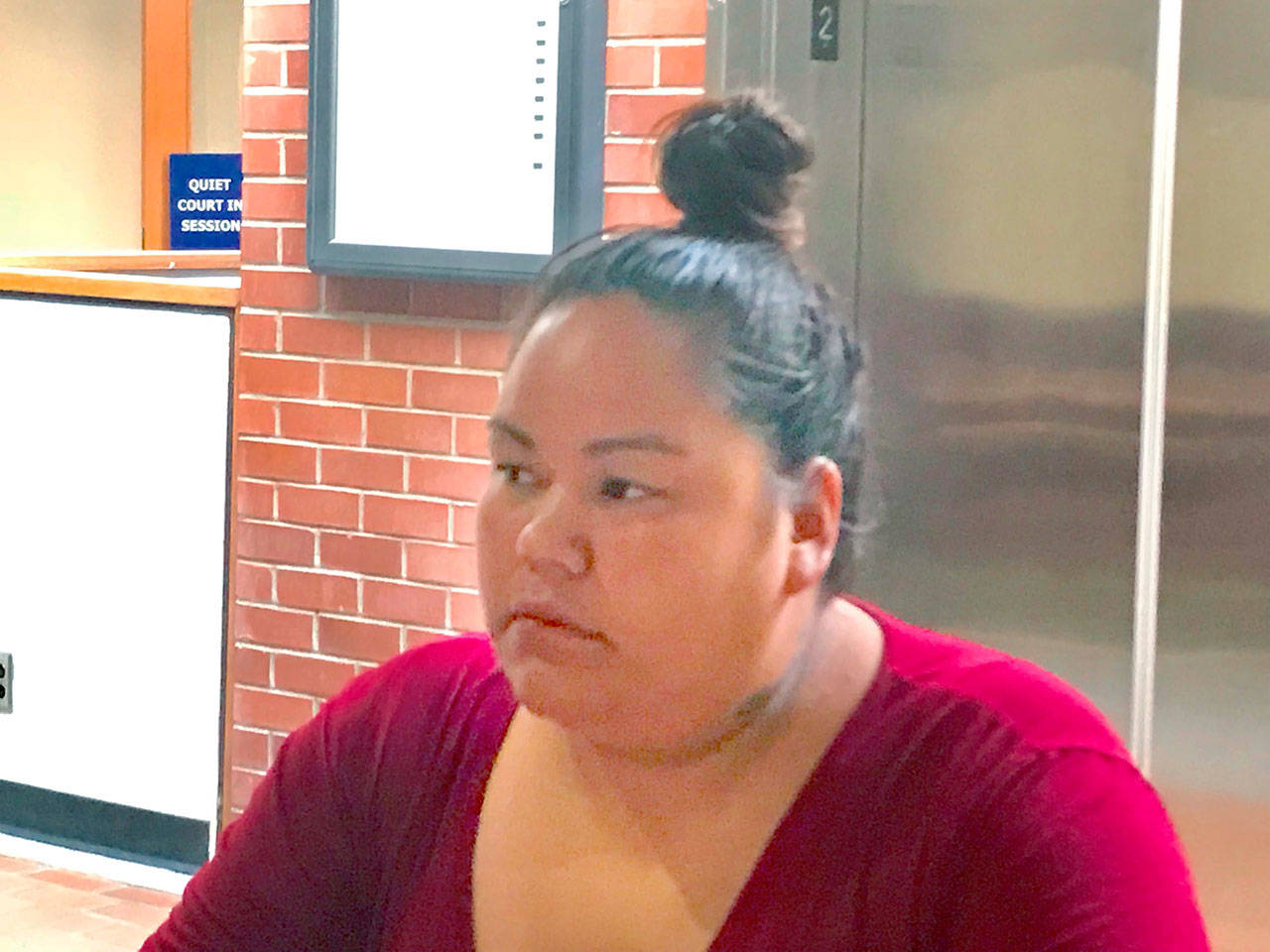PORT ANGELES — A trained child care provider accused of failing to report her mother’s fatal abuse of 2½-year-old family member Isaac Ward Martinez was sentenced Wednesday in Clallam County Superior Court.
Michelle Ann Ward, 29, of Forks will be required to undergo up to six months of inpatient drug and alcohol treatment at a Spokane facility and two years of community custody.
Michelle Ward, a Quileute tribal member, has not spent time in jail and will not unless she violates the conditions of her sentence and a judge decides to incarcerate her.
“If the court had its way, you would be going to prison,” Judge Christopher Melly said.
“The fact is, if the court sent you to prison, you would come out of prison with the same problem you have today in terms of substance abuse.”
Michelle Ward pleaded guilty Oct. 18, 2017, to second-degree criminal mistreatment-domestic violence and solicitation to deliver a controlled substance, oxycodone, to her mother, after first being charged with second-degree manslaughter.
Ward’s mother, tribal member Ramona Jean Ward, 46, of Forks was sentenced June 4 to 26½ years in prison for the Nov. 11, 2016, death of Isaac.
She pleaded guilty to homicide by abuse-domestic violence after her daughter had agreed to testify against her.
The child had several new and healing broken bones, lacerations, bleeding in the brain and malnutrition when Ramona Ward found him unresponsive on the floor of her bedroom Nov. 9, 2016 after he fell off the bed, said investigators.
The child was transported to Harborview Medical Center in Seattle, dying two days later, the cause of death being blunt force trauma to the head.
He had been placed in Ramona Ward’s care by Michelle Ward, who lived in her mother’s 1,328-square-foot Calawah Way home with seven children, according to court records. The children were Isaac, Isaac’s two middle-school-age brothers, and Michelle Ward’s four children. Issac was Michelle Ward’s cousin’s son.
A girl who was 12 when Isaac died and who lived in the home said eight children lived there, according to her victim impact statement, which was read in court Wednesday.
Isaac’s bloodstains were found in 15 different areas of the home, but mostly in Ramona Ward’s bedroom, according to court records.
“[Michelle Ward] never observed the systematic torture that took place, but she should have known and she should have stopped it,” said Steve Johnson, deputy prosecuting attorney.
“[Indian Child Welfare Services] put Michelle Ward in charge of Isaac’s well-being, and unfortunately, he died.”
But he said having Ward stand trial would “retraumatize and newly traumatize” children who lived in the home with Isaac.
Ward, who cannot have contact with her children, “has a last opportunity to take care of herself and get her substance abuse situation under control.”
Two of the children living in the home told an Indian Child Welfare Services manager who visited the home that Ramona Ward was physically abusing and “beating up” Isaac, but nothing was done, and the manager told one of the children that she was lying, according to Ramona Ward’s probable cause statement.
Michelle Ward said she never saw her mother physically abuse Isaac, “and when she would return home from a long day, she would go straight to her bedroom without seeing any of the other children,” according to Michelle Ward’s probable cause statement.
Michelle Ward cried through much of the hearing.
“If I could go back in time, I would,” she told Melly in a brief statement.
“I’m very sorry.”
Ward, who will turn 30 Nov. 3, said she will spend the rest of her life feeling “horrible” for what happened.
“The operative phrase in there is life,” Melly responded.
“You have a life to feel guilty about, and Isaac doesn’t.”
In June 2014, little more than two years before Isaac Ward Martinez died, Michelle Ward had completed courses on mandated reporting of child abuse and the identification of child abuse and neglect, court records said.
Ramona Ward told an investigator that Isaac could not talk, according to her probable cause statement.
“He only communicated by holding his arms up like he wanted to be held while rubbing his thumbs against his fingers as a way of communication,” according to the statement.
She would not let others in the house hold him or play with him, and he was not allowed to go outside, according to a victim impact statement that Johnson read in court.
During another impact statement, Isaac’s great aunt, Roseann Fonzi, held a giant photo of Isaac and his family before Melly.
Fonzi said it was wrong that Ward would not receive jail time for failing to report the abuse.
In a written statement, one of Isaac’s brothers said Michelle Ward “had a part” in his brother’s death by knowing he was being hurt and doing nothing.
“If she told Mona to stop, he would still be alive,” Isaac’s other brother wrote.
“When Mona would go by Isaac, he would flinch and get scared,” said a girl who lived in the home and was 12 when Isaac died.
“Isaac was little and cute and I just loved when he laughed,” she said.
“I just wish he had laughed a lot more.”
The children who lived in the home are in foster care, Johnson said in a later interview.
Melly will decide next week if a mental health evaluation of Ward will be unsealed that he temporarily sealed at Ward’s lawyer’s request.
Stan Myers of Port Angeles, representing Ward, did not explain why he did not want the evaluation to be made public. He has until next week to file a formal motion.
________
Senior Staff Writer Paul Gottlieb can be reached at 360-452-2345, ext. 55650, or at pgottlieb@peninsuladailynews.com.

